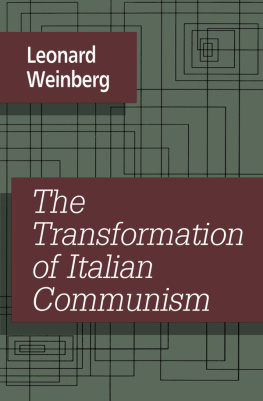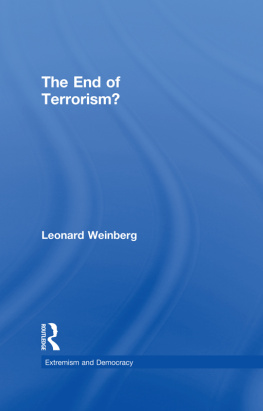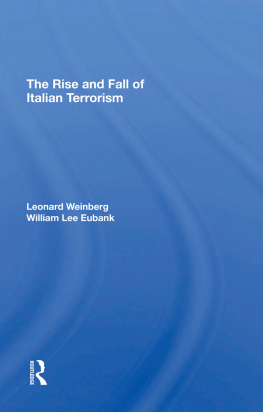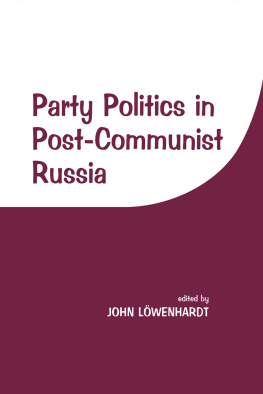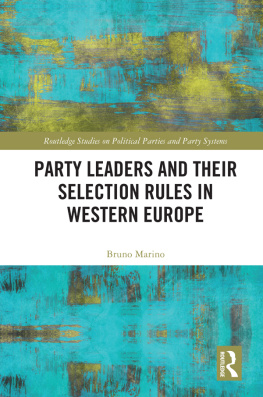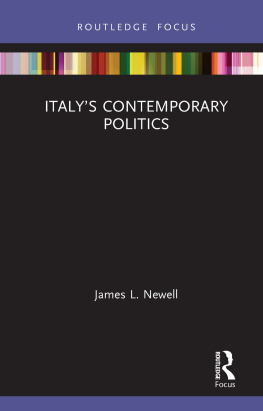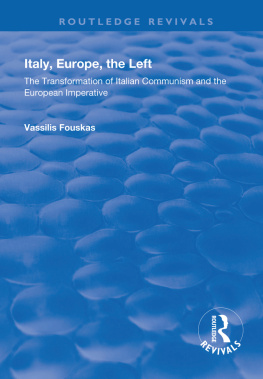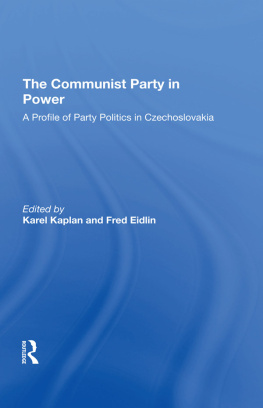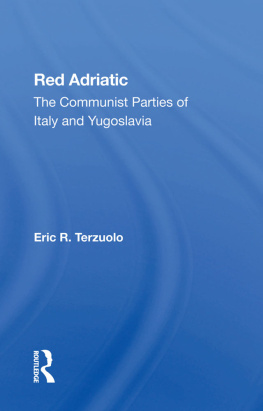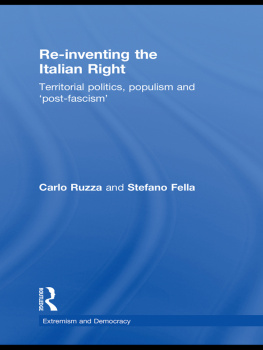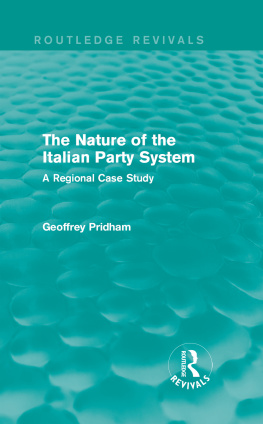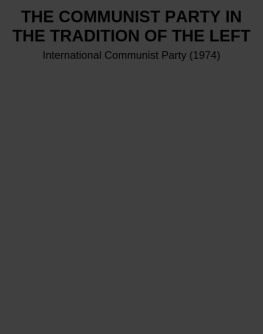First published 1995 by Transaction Publishers
Published 2017 by Routledge
2 Park Square, Milton Park, Abingdon, Oxon OX14 4RN
711 Third Avenue, New York, NY 10017
Routledge is an imprint of the Taylor and Francis Group, an informa business
Copyright 1995 by Taylor & Francis.
All rights reserved. No part of this book may be reprinted or reproduced or utilised in any form or by any electronic, mechanical, or other means, now known or hereafter invented, including photocopying and recording, or in any information storage or retrieval system, without permission in writing from the publishers.
Notice:
Product or corporate names may be trademarks or registered trademarks, and are used only for identification and explanation without intent to infringe.
Library of Congress Catalog Number: 94-8721
Library of Congress Cataloging-in-Publication Data
Weinberg, Leonard, 1939-
The transformation of Italian communism / Leonard Weinberg,
p. cm.
Includes bibliographical references and index.
ISBN 1-56000-180-1
1. Partito comunista italianoHistory. 2. CommunismItalyHistory. 3. ItalyPolitics and government1945- . I. Title.
Jn5657.C63W45 1994
324.245075dc20
94-8721
CIP
ISBN 13: 978-1-56000-180-5 (hbk)
This study has two purposes. The first is descriptive and the other analytical. It provides readers with a detailed account of how the Italian Communist Party (PCI) was transformed into the Democratic Party of The Left (PDS) and the meaning of that occurrence for Italys troubled political party system. Second, this study aspires to achieve a somewhat broader goal. Its more ambitious objective is to call readers attention to the impact of international developments on domestic party politics not only in Italy but among the industrialized democracies in general. Accordingly, it is a study of a single case but one that points towards a truly widespread, though often neglected, phenomenon.
Not many years ago, the PCI was a powerful force in Italian politics. Because of its mass membership and substantial support among Italian voters, the PCI was the largest non-ruling communist party in the Western world. Its participation in the underground Resistance movement to Nazi-Fascist control of Italy during World War II had earned the party enormous prestige. Its sensitivity to the role of culture in Italian society, a sensitivity not unrelated to Antonio Gramscis writings, helped win the support of a large number of Italys leading intellectualsartists, writers, scientists, musicians, film makerswho saw it as the only plausible means available for transforming or at least reforming the countrys distorted economy and corrupt political system. Abroad, political observers in the United States, as well as other Western European nations, who detested the Soviet Union and the other Communist regimes of Eastern Europe, often came to view the PCI as a democratic and progressive force in Italian society, one worthy of emulation by communist parties in France, Spain and elsewhere.
Furthermore, over the course of the PCIs postwar career, certainly by the mid-1970s, it sometimes appeared as if the party was destined to rule Italy, its pursuit of power having an inexorable quality to it.
The immediate source of all this distress was an event that caused immense glee in other parts of Europe. When the Berlin Wall came down during the evening of November 9-10, 1989, Achille Occhetto, the PCIs recently chosen secretary, reached the conclusion that the division of Europe dating from the Yalta Conference of 1945 had come to an end. The cold war was finally over. At the time of this momentous development Occhetto was in Brussels conferring with Neil Kinnock, the British Labour party leader, over the future of the European Left. As they both watched the Wall coming down on television, Occhetto told Kinnock what he intended to do about this event and the other historic changes that were occurring in Eastern Europe during the fall of 1989. A few days later he first informed members of his own party.
On November 12 Occhetto took the opportunity provided by a meeting of wartime Resistance veterans in Bologna to announce his intention not only to change his partys name, a possibility that had been under discussion for some time, but to replace the PCI with a completely new political formation. Dismantling the PCI proved to be no easy task. Despite the peremptory nature of Occhettos decision, he certainly had his work cut out for him, as will be seen. Supporters and opponents of party change struggled for over a year before Occhetto was able to achieve his objective. That objective involved the formation of the PDS, a new postcommunist political party. In achieving this goal Occhetto and his followers sought to create a modern political organization, one which would appeal to the increasingly prosperous and issue-sensitive Italian electorate without the burden of the PCIs Marxist heritage. And by divesting itself of its communist past, the new party, Occhetto hoped, would come to rule Italy, the aim its predecessor had never been able to reach.
To understand the PCIs transformation into the PDS without discussing the broader international context in which it occurred would be to attempt to stage a performance of Hamlet without the Prince of Denmark. The necessity of such a discussion, in turn, raises a broader issue, one concerning the general effect of international forces on domestic party politics. Somewhat surprisingly, this is a subject which does not appear to have prompted much commentary among political scientists interested in the nature of party politics within the industrialized democracies.
In order to compensate for the limited amount of attention this topic has received, the first chapter of this study will offer a discussion and a set of relevant concepts, which, it is hoped, will prove useful in helping to understand the impact of international developments on political party life within the western democracies.
will introduce readers to the Italian political system, a system often depicted as immobile or blocked but one presently (1993) going through a process of profound change. In any event, the party systems defining attributes will be discussed, along with the various historic events, social circumstances and economic conditions that are widely believed to have determined its shape. At this point, there will be a discussion of the various international forces at work in postwar Italy which also played a crucial role in shaping the structure of party politics.
Next, there will be a relatively long chapter in which the PCIs transformation into the Partito Democratico della Sinistra (Democratic Party of the LeftPDS) will be described in some detail. Attention will also be paid, though not as much, to the efforts of Occhettos opponents to retain a Communist presence in Italy by forming the Rifondazione Comunista, a refounded communist party. There will be commentary on the impact the dramatic events of 1989 had on the various party leaders seeking to promote or retard the end of Italian communism.
will describe how a mass party with a large professional staff and many ancillary organizations under its auspices has been transformed into a light party that appeals for support to individual Italian citizens rather than the countrys working classes. Consideration also will be given to efforts by supporters of party reform to borrow organizational forms (e.g., the shadow government) used in other countries to promote their objectives.

